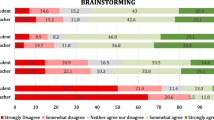Abstract
Problem-solving skills and understanding of domain, knowledge (e.g., fighting misconceptions) are important goals in both secondary and tertiary science education. A prototype of an instructional task is presented which aims at improved problem-solving skills based on understanding of domain knowledge. In this task, comparing carefully selected solved problems by groups of students is utilised as a learning activity for the acquisition of adequate problem schemata. The task is designed as a part of the so-called UBP-program (UBP=Understanding Based Problem solving) currently being developed, for education in science. The result of an evaluative study for the field of mechanics is presented. The UBP-task appears apt to improve problem-solving skills at a less advanced level of physics education (e.g., 10th grade), especially for students normally performing poorly—who are often girls.
Similar content being viewed by others
References
Ahn, W. K., Brewer, W. F., & Mooney, R. J. (1992). Schema acquisition from a single example.Journal of Experimental Psychology: Learning Memory and Cognition, 18(2), 391–412.
Alba, J. W., & Hasher, L. (1983). Is memory schematic?Psychological Bulletin, 93, 203–31.
Chi, M. T. H., Feltovich, P. J., & Glaser, R. (1981). Categorization and representation of physics problems by experts and novices.Cognitive Science, 5, 121–152.
Chi, M. T. H., Bassok, M., Lewis, M. W., Reimann, P., & Glaser, R. (1989). Self-explanations: How students study and use examples in learning to solve problems.Cognitive Science, 13, 145–182.
Dreyfus, H. L., & Dreyfus, S. E. (1986). Why skills cannot be represented by rules. In N.E. Sharkey (Ed.),Advances in cognitive science (Vol. 1) (pp. 315–335). Chichester, UK: Ellis Horwood.
Elshout-Mohr, M. (1992). Metacognitie van lerenden in onderwijs leerprocessen [Metacognition of learners in educational learning processes].Tijdschrift voor Onderwijsresearch, 17(5), 1–17.
Ferguson-Hessler, M. G. M., & de Jong, T. (1987). On the quality of knowledge in the field of electricity and magnetism.American Journal of Physics, 55(6), 492–497.
Gick, M. L. (1986). Problem-solving strategies.Educational Psychologist, 21, 99–120.
Gick, M. L., & Holyoak, K. J. (1980). Analogical problem solving.Cognitive Psychology, 12, 306–355.
Gick, M. L., & Holyoak, K. J. (1983). Schema induction and analogical transfer.Cognitive Psychology, 15, 1–38.
Guidoni, P. (1985). On natural thinking.European Journal of Science Education, 7(2), 133–140.
Holyoak, K. J. (1985). The pragmatics of analogical transfer. In G. Bower (Ed.),The psychology of learning and motivation (Vol. 19) (pp. 59–87). New York: Academic press.
Lesh, R.A. (1981). Applied mathematical problem solving.Educational Studies in Mathematics, 12, 235–264
Melezinek, A. (1986).Ingenieurspaedagogik: Praxis der vermittlung technischen wissens [Pedagogy for educating engineers] (pp. 118–132. New York, USA: Springer-Verlag.
Newell, A., & Simon, H.A. (1972).Human problem solving. Englewood Cliffs: Prentice Hall.
Palinscar, A. S., & Brown, A. L. (1984). Reciprocal teaching in comprehension-fostering and comprehension-monitoring activities.Cognition and Instruction, 1, 117–175.
Prawat, R. S. (1989). Promoting access to knowledge, strategy, and disposition in students: A research analysis.Review of Educational Research, 59, 1–41.
Rumelhart, D. E., & Norman, D. A. (1981). Analogical processes in learning. In J. R. Anderson (Ed.),Cognitive skills and their acquisition (pp. 335–361). Hillsdale, NJ: LEA.
Scardamalia, M., & Bereiter, C. (1985). Fostering the development of self-regulation in childrens' knowledge processing. In S. F. Chipman, J. W. Segal, & R. Glaser (Eds.),Thinking and learning skills (Vol. 2, Research and open questions) (pp. 563–577). Hillsdale, NJ: Erlbaum.
Shaughnessy, J. M. (1985). Problem solving derailers: The influence of misconceptions on problem-solving performance. In E. A. Silver (Ed.),Teaching and learning mathematical problem solving (pp. 399–415). Hillsdale, NJ: LEA.
Slavin, R. E. (1990).Cooperative learning: Theory, research and practice. Englewood-Cliffs, NJ: Prentice Hall.
Steiner, G. (1992). Semantic network theory applied to mathematics education: a microanalysis. In T. Plomp, J. M. Pieters, & A. Feteris (Eds.),Book of summaries—European Conference on Educational Research (Vol. 1) (pp. 232–235). Enschede, The Netherlands: University of Twente.
Taconis, R. (1995).Understanding based problem solving: Towards qualification-oriented teaching and learning in physics education. Unpublished doctoral dissertation, Eindhoven University of Technology, Eindhoven, The Netherlands.
Taconis, R., & Ferguson-Hessler, M. G. M. (1993, April).A problem-solving perspective on misconceptions in mechanics. Paper presented as the annual meeting of the American Educational Research Association, Atlanta, USA.
Taconis, R., Willems, R.H.M., Vennix, A., & Rinkens, R. (1995). Probleemoplossen op basis van begrip [Problem solving on the basis of understanding]. Final report on the de ANGO-project (SVO-project 94706). Eindhoven/Amsterdam, The Netherlands: Graduate School of Teaching and Learning, University of Amseterdam/Eindhoven University of Technology.
Terwel, J., & Van den Eeden, P. (1992). Curriculum evaluation and multilevelanalysis: Effects of cooperative learning in, mathematics.Studies in Educational Evaluation, 18, 133–148.
Viennot, L. (1979). Spontaneous reasoning in elementary dynamics.European Journal of Science Education, 1(2), 205–221.
Heuvelmans, A. P. J. M., & Sanders, P. F. (1993). Beoordelaarsbetrouwbaarheid [Agreement between judges]. In: T. J. H. Eggen, & P. F. Sanders (Eds.), Psychometrie in de praktijk [Psychometric practice] (pp. 443–469). Arnhem, The Netherlands: Centraal Instituut voor Toets Ontwikkeling (CITO).
Author information
Authors and Affiliations
Corresponding author
Rights and permissions
About this article
Cite this article
Taconis, R., Van Hout-Wolters, B. Systematic comparison of solved problems as a cooperative learning task. Research in Science Education 29, 313–329 (1999). https://doi.org/10.1007/BF02461596
Issue Date:
DOI: https://doi.org/10.1007/BF02461596



